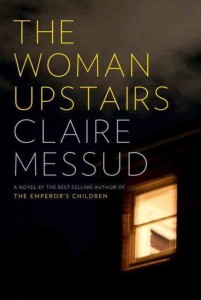Anger.
On page one Messud gives us an angry woman. Is that allowed? Women are supposed to tamp down their rage so as not to upset others. And writers are told to work up to an intensity of emotion because if you start with high passion, where can you go from there?
Messud shows us in this brilliant novel. Nora Eldridge is the woman of the title: the quiet single woman who never keeps you awake with loud parties, whose help can be called on when needed, a woman for whom “Once your mother dies, nobody loves you best of all.” A second-grade teacher who regularly calls and visits her elderly father and irregularly sees her married lesbian friend, Nora’s early dreams of becoming a famous artist have withered to her seldom-used “studio” aka the second bedroom.
I was captivated immediately by Nora’s voice. Unlike Barbara Pym’s excellent women, Nora is open about her passions. She says her anger is “not because of all the chores and all the making nice and all the duty of being a woman—or rather, of being me—because maybe these are the burdens of being human.” What she’s angry about is the “hall of mirrors,” a society that is “lost in appearances” where every door that seems to lead to a more authentic life (though she wouldn’t say it that way) just leads to more mirrors.
It’s not just thwarted ambition; it’s the sense that she’s done everything right and ended up empty-handed. Influenced by her now-dead mother’s admonitions to be independent and not rely on an allowance from a husband, she postponed marriage and children to the point where it now seems too late. The idea that turning forty seems like the end to her may seem absurd, given our long and often late-blooming lives, but I know many women feel that way.
Meeting a professional artist, a successful woman on the verge of breaking out to international fame, sends Nora into unknown territory. Italian Serena Shahid has come to Cambridge, Massachusetts in this beginning of the 21st century with her husband, Lebanese Skandar, for his year-long fellowship at Harvard. When their son Reza appears in Nora’s classroom, Nora falls in love with him, and ultimately with both of his parents.
As they become friends, Serena asks Nora to share a studio with her, not only prompting Nora to take up her own art again, but also giving her the chance to be around a “real” artist at work.
I’ve heard often from writers and artists about their feelings of imposter syndrome and certainly felt it myself at the beginning of my career. If you’re not careful, the goal post of deciding you are a real writer or artist can keep moving: completing the novel, publication, achieving a certain sales number, bestseller, matching some perceived rival’s status. The only way off the hamster wheel is to accept in your heart of hearts that, as Julia Cameron says, since you create, you are an artist, whatever your medium.
Messud raises valid questions about what it means to be an artist. Does it mean, if you don’t want to simply work in obscurity, sucking up to the pretentious gatekeepers, those who schedule shows and write reviews and hang out with the “right” people? What must you sacrifice? What do you have to tell yourself?
I’m rarely angry, but I could relate to Nora. Plus the questions raised are ones I have long been interested in. As a memoirist and teacher of memoir-writing, ethical questions around creating abound. Even more, though, ever since the women’s movement of the 1970s I’ve been fascinated by the choices women make within the changing and unchanging constrictions of our society.
The writing is amazing. Nora’s voice just would not let me go as her relationship to her art, to the members of the Shahib family, to herself, all twist and turn, tangle and untangle. I’ve rarely encountered such an inhabited voice, one that leaves me feeling as though I truly know this woman. The passion in her voice is sculpted with a poet’s concision for maximum effect.
I always understood that the great dilemma of my mother’s life had been to glimpse freedom too late, at too high a price. She was of the generation for which the rules changed halfway, born into a world of pressed linens and three-course dinners and hairsprayed updos, in which women were educated and then deployed for domestic purposes — rather like using an elaborately embroidered tablecloth on which to serve messy children their breakfast.
Each phrase is so perfect: “deployed for domestic purposes!”
I especially relished the descriptions of the art: Serena’s Wonderland installation, Nora’s tiny boxes, each a room in a famous woman artist’s life. The ending felt a bit rushed, but satisfying. It left me speculating about what Nora would do next.
What novel have you read that cast a new light on your own experience?
